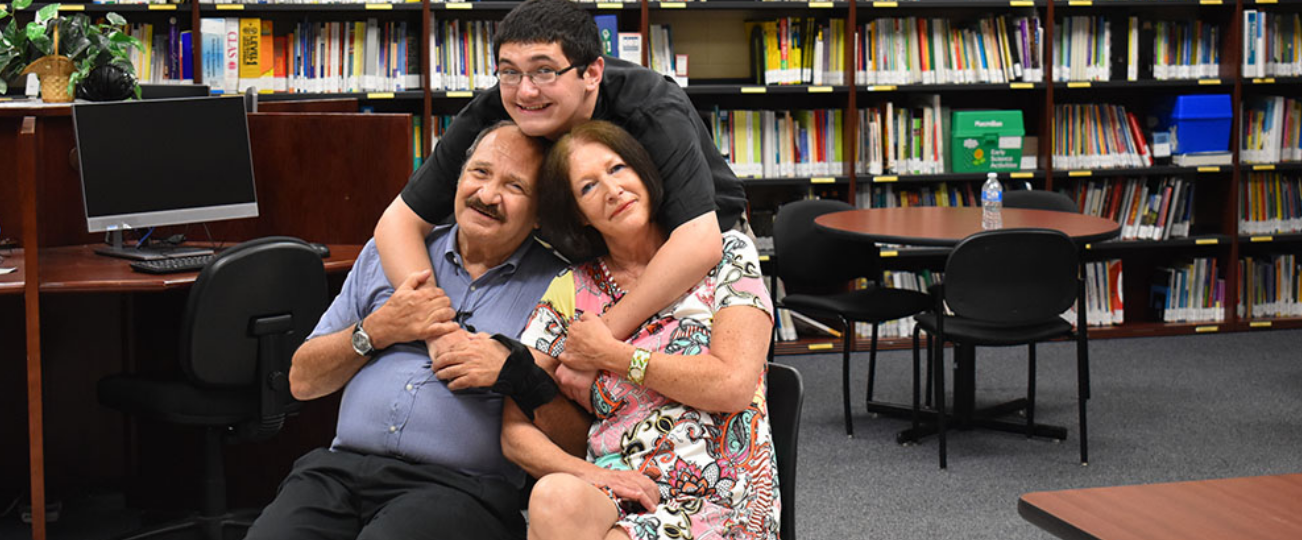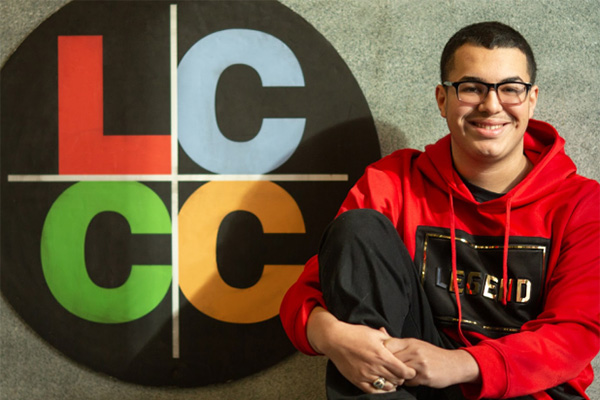LCCC’s SEED program inspires students with disabilities

Transitioning from high school to college is a stressful time, and it’s a stage of life that can be filled with unique challenges for students with disabilities and their families.
“My parents wanted to find the perfect program for me, and that is how they found the SEED program,” says student Claudio Zaffarese, who is beginning his second year of the program.
The SEED program at Lehigh Carbon Community College provides comprehensive support for students with disabilities. SEED offers personalized, student-driven programs, and it encourages confidence and autonomy in students.
“I remember in the past, saying the future is like looking into a black hole,” says Claudio’s mother, Sallie Richardson. “This program helps with that and gave us the joy of seeing our son happy.”
Claudio’s original goal as he graduated high school was to work at a thrift store. But after spending time in the SEED program and taking a few art classes at LCCC, he has decided to pursue a career in graphic design.
“He is turning into a man,” says Claudio’s father, Joseph Zaffarese. “The school works with him and, with that assistance, he does very well.”
LCCC, in collaboration with the Lehigh Valley Center for Independent Living, started the SEED program in 2015. SEED, which stands for Success, Engagement, Education and Determination, aims to support students in all aspects, not just academics. Students may choose to focus on academics or career goals, and both tracks incorporate life skills like stress management and critical thinking.
Claudio’s parents appreciate what SEED has provided for their son. Thanks to SEED, Claudio has not only succeeded academically, but he has learned real-world skills like how to pay bills and handle money.
SEED offers a bridge to success
SEED students begin their journey at LCCC with a mandatory four-week Summer Bridge program. The students learn collegiate skills such as writing papers, time management and communication. Bridge is also when students begin the process of person-centered planning, which provides a living document that will help SEED coaches offer individualized support for each student.
“Bridge is the time to find out how each student clicks,” SEED Director Michelle Mitchell says. “We get to know students so that we know how to move forward with support. Being hands-on is why we are so successful.”
The person-centered planning document is a collaboration between the student, their coach and the student’s “team,” which can include parents or friends. The coach’s role is not to make decisions for the student, but to remind them and make suggestions based on professional opinion, such as Claudio’s decision to pursue graphic arts.
“I went to LCCC because I wanted to be in graphic design,” Claudio said. “I was wondering if I could do it on my own, and Abby Jefcoat taught me about it.”
SEED coaches make all the difference
Jefcoat is one of the coaches from the Lehigh Valley Center for Independent Living who work with the SEED program. She and the other coaches are in frequent contact with the students once the fall semester begins, so that they can support the students’ academic needs and empower them.
“I love coming in to work every day,” Jefcoat said. “Working with students and being able to see them grow and achieve their goals is amazing.”
Jefcoat says she knows that the program works because she sees the students grow and mature. Each SEED student is different, so the individual support is provided during regular check-ins with their coach, which boosts students’ success in the classroom.
“More students could benefit from frequent feedback,” LCCC art professor Corinne Lalin says.
Lalin has worked closely with SEED students in her art courses. She believes that art is a great way to teach all kinds of learners, particularly due to the practice of peer feedback, which is frequent in Lalin’s courses. Students initially struggle with discussing their projects with peers and giving feedback on others’ work.
“Throughout the semester, I have seen an increase in confidence,” Lalin says. “My students
become more comfortable with critiques and I see more autonomy.”
Jefcoat has also seen students benefit from the social aspects of college, like joining various clubs and participating in class discussions. Because the SEED students build connections as they move through their college experience, it often makes it easier for them to transition into the community.
“I know it can be scary to see your kid off to college,” Jefcoat says, “but I have seen the success that students have in transitioning into college.”
From SEED student to peer mentor
Jacob Taschler is a third-year SEED student working toward a business management degree. When he first started at LCCC, he struggled with anxiety, which made it difficult for him to interact with peers and try new things.
“I have Asperger’s, and a lot of my problems stem from severe anxiety, so everything was a ‘no’ with me,” Taschler said. “I never said ‘yes’ and I wanted to be left alone.”
Through his experience with SEED, Taschler began to step out of his comfort zone because of his desire to help other students.
“Jacob is far more outgoing than he had been prior to SEED,” says Jacob’s father, Arthur Taschler. “He is self-advocating and asking for things that he feels he needs to help himself in college.”
Jacob started the program as a student and now is employed by SEED as an activity peer facilitator. Some of his responsibilities include light tutoring, helping students find college resources, and helping them relax and unwind in the structured study lounge, which is a designated area in LCCC’s library for SEED students to connect with each other and their coaches.
“I realized one day there is no reason to be nervous and anxious. I am helping people and going to college and making myself stronger,” Taschler said.
“SEED and its coaches are an incredible program,” says Arthur Taschler. “They’re a group of people dedicated to help our kids succeed. As parents, we all want to see our kids be self-sufficient and self-advocate for their needs, especially when we are no longer here and able to help them.”
-Natasha worked as an intern in LCCC’s Office of College Relations in summer 2018. She transferred to Cedar Crest College to pursue a bachelor’s degree in New Media.

